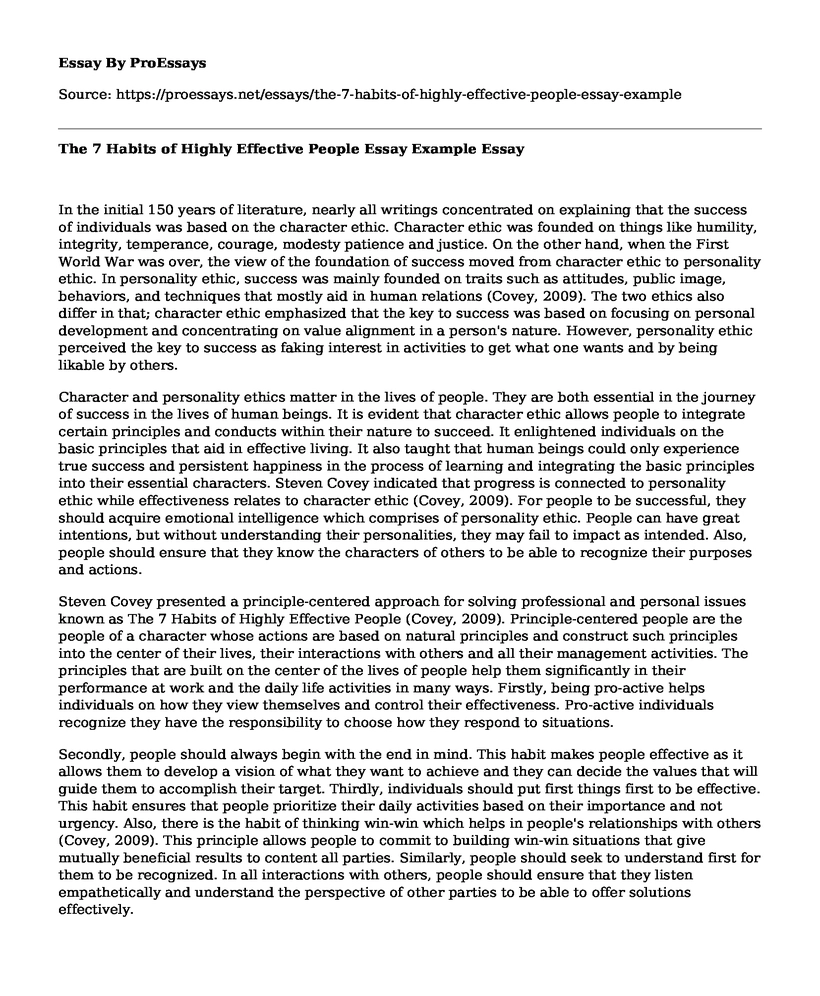In the initial 150 years of literature, nearly all writings concentrated on explaining that the success of individuals was based on the character ethic. Character ethic was founded on things like humility, integrity, temperance, courage, modesty patience and justice. On the other hand, when the First World War was over, the view of the foundation of success moved from character ethic to personality ethic. In personality ethic, success was mainly founded on traits such as attitudes, public image, behaviors, and techniques that mostly aid in human relations (Covey, 2009). The two ethics also differ in that; character ethic emphasized that the key to success was based on focusing on personal development and concentrating on value alignment in a person's nature. However, personality ethic perceived the key to success as faking interest in activities to get what one wants and by being likable by others.
Character and personality ethics matter in the lives of people. They are both essential in the journey of success in the lives of human beings. It is evident that character ethic allows people to integrate certain principles and conducts within their nature to succeed. It enlightened individuals on the basic principles that aid in effective living. It also taught that human beings could only experience true success and persistent happiness in the process of learning and integrating the basic principles into their essential characters. Steven Covey indicated that progress is connected to personality ethic while effectiveness relates to character ethic (Covey, 2009). For people to be successful, they should acquire emotional intelligence which comprises of personality ethic. People can have great intentions, but without understanding their personalities, they may fail to impact as intended. Also, people should ensure that they know the characters of others to be able to recognize their purposes and actions.
Steven Covey presented a principle-centered approach for solving professional and personal issues known as The 7 Habits of Highly Effective People (Covey, 2009). Principle-centered people are the people of a character whose actions are based on natural principles and construct such principles into the center of their lives, their interactions with others and all their management activities. The principles that are built on the center of the lives of people help them significantly in their performance at work and the daily life activities in many ways. Firstly, being pro-active helps individuals on how they view themselves and control their effectiveness. Pro-active individuals recognize they have the responsibility to choose how they respond to situations.
Secondly, people should always begin with the end in mind. This habit makes people effective as it allows them to develop a vision of what they want to achieve and they can decide the values that will guide them to accomplish their target. Thirdly, individuals should put first things first to be effective. This habit ensures that people prioritize their daily activities based on their importance and not urgency. Also, there is the habit of thinking win-win which helps in people's relationships with others (Covey, 2009). This principle allows people to commit to building win-win situations that give mutually beneficial results to content all parties. Similarly, people should seek to understand first for them to be recognized. In all interactions with others, people should ensure that they listen empathetically and understand the perspective of other parties to be able to offer solutions effectively.
Conclusion
It is essential for people to be principle-centered for them to be effective in life. In being principle-centered, individuals should be ready to synergize. Through synergy, people can understand and value the differences in the perspectives of others. It also aids in openness and creativity which allows people to do away with old ways of doing things and uncover new ways. Furthermore, synergy will enable people to use creativity in finding solutions that favor everyone and sidestepping negative energy to see the good in others. Additionally, for people to lead a principle-centered life, they should dedicate themselves in ensuring that they are renewing themselves mentally, socially, physically and spiritually (Covey, 2009). When people are renewed continuously, they can increase their ability to practice each principle synergistically.
References
Covey, S. R. (2009). The 7 habits of highly effective people. New York, NY: Simon & Schuster.
Cite this page
The 7 Habits of Highly Effective People Essay Example. (2022, Nov 20). Retrieved from https://proessays.net/essays/the-7-habits-of-highly-effective-people-essay-example
If you are the original author of this essay and no longer wish to have it published on the ProEssays website, please click below to request its removal:
- Female Suicide Bombers
- Reflection Paper on Intimacy
- Diversity and Consciousness Essay Example
- Paper Example on Sleep Apnea: A Serious Sleep Disorder Requiring Medical Attention
- Essay Example on Ageing Mobility: Key to Global Age-Friendly Cities Project
- Essay Example on Child Abuse: Unveiling Causes of a Contentious Issue
- Human Factors: Understanding the SHELL Model for Accidents - Essay Sample







